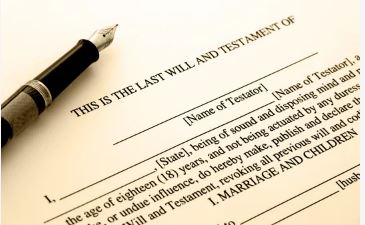What is Included in a Will?
A will is a legal document that determines how a person’s estate is managed and distributed after their death. It ensures that loved ones, including a spouse or civil partner, are taken care of and that assets are allocated according to the testator’s wishes. Without a valid will, UK intestacy laws decide who inherits the estate, which may not reflect the deceased’s intentions, especially in the case of civil partners.
This guide explains the key elements included in a UK will, legal requirements, and additional considerations.
Why You Need a Will

Creating a will is crucial for everyone, regardless of the size of their estate. A will ensures that your assets and possessions are distributed according to your wishes, providing peace of mind that your loved ones and chosen organisations will benefit as you intend. Without a will, the law dictates how your estate is divided, which may not align with your personal wishes. This is particularly important for unmarried partners and those in a civil partnership, as they do not automatically inherit from each other without a will.
Moreover, a well-structured will can help reduce the amount of inheritance tax payable on your estate. By seeking legal advice and planning ahead, you can take advantage of various tax reliefs and exemptions, potentially lowering the inheritance tax bill for your beneficiaries. Life circumstances change, and it’s essential to update your will to reflect these changes, ensuring it remains valid and relevant.
Essential Components of a Will
A will must contain several key elements to be legally effective.
Testator’s Details
A will must begin with the full name, address, and date of birth of the testator—the person making the will. It should include a clear statement that the document is their final will and testament.

Appointment of Executors
Executors are responsible for carrying out the instructions in the will. They handle financial matters, pay off debts, and distribute assets to beneficiaries. It is common to appoint at least one executor, but multiple can be named, with a maximum of four. Appointing more than one executor can help share the responsibilities involved in executing a will, making the process more manageable and ensuring that tasks are completed efficiently.
Some people choose professional executors, such as solicitors or banks, to handle complex estates. It is also advisable to name a substitute executor in case the primary choice is unable or unwilling to act.
Beneficiaries and Distribution of Assets
A will must clearly identify the beneficiaries—the individuals or organisations set to inherit from the estate. Each beneficiary should be named, along with details of what they will receive. Inheritance can take different forms, including fixed monetary gifts, specific items such as jewellery or property, or a percentage of the remaining estate. It is also common to name alternative beneficiaries in case a primary recipient passes away before the testator.
Guardianship for Children
If the testator has children under 18, appointing a guardian is essential. This ensures that, in the event of their death, the children will be cared for by a trusted person rather than having their future determined by the courts. The guardian’s role includes overseeing the child’s upbringing, education, and general welfare.
Funeral Wishes
While funeral instructions in a will are not legally binding, they can guide family members during an emotionally difficult time. The testator may specify their funeral arrangements, including whether they prefer burial or cremation, as well as any specific requests regarding the service. However, since wills are often read after a funeral takes place, it is also advisable to discuss these wishes with family members in advance.
Debts and Liabilities
A will should address any outstanding debts, including mortgages, loans, and credit card balances. The executor is responsible for ensuring these debts are settled before distributing the estate. Some testators choose to specify how they would like debts to be paid, such as from specific accounts or assets.
Assets to Consider in Your Will

When drafting your will, it’s vital to consider all the assets you own to ensure they are distributed according to your wishes. Here are some key categories to include:
- • Property
- • Investments
- • Possessions
- • Cash
- • Digital Assets
- • Business Assets
It’s important to have your assets valued regularly, as their value can fluctuate over time. This ensures that your will accurately reflects the current value of your estate, helping to carry out your wishes effectively.
Legal Requirements for a Valid Will in the UK
For a will to be legally valid in the UK, it must meet specific conditions. The testator must be at least 18 years old, unless they are in the armed forces, in which case they can make a will from the age of 16. They must also be of sound mind and free from coercion when making their decisions.
The will must be in writing and signed by the testator in the presence of two independent witnesses. These witnesses must also sign the will in the testator’s presence. Witnesses cannot be beneficiaries or the spouses of beneficiaries, as doing so would invalidate any gifts left to them in the will.
A codicil must be signed and witnessed in the same way as the original will.
Inheritance Tax and Your Will
Inheritance tax is a levy on the estate of someone who has passed away, and it’s the executor’s responsibility to ensure it is paid. When making a will, it’s essential to consider how inheritance tax will impact your estate and explore ways to reduce the tax burden. Here are some strategies:
- • Leaving Gifts to Charity
- • Using Trusts
- • Making Use of Exemptions
To ensure you are making the most of these exemptions and reliefs, it’s crucial to seek legal advice. A professional can help you navigate the complexities of inheritance tax and structure your will in a way that benefits your beneficiaries the most.
Other Important Factors to Consider
Setting Up a Trust

Some wills include trusts to manage assets for beneficiaries, particularly in cases where the beneficiaries are minors, have disabilities, or require financial protection over time. A discretionary trust allows the executor to decide how funds are distributed, while a life interest trust grants a person access to assets for their lifetime before passing them on to another individual.
Significant changes to a trust may require creating a new will to ensure legality and clarity.
Digital Assets
In today’s digital age, many people have online assets, including bank accounts, social media profiles, and cryptocurrency holdings. A will can include instructions on how these assets should be handled, ensuring that valuable or sentimental digital possessions are not lost. It is advisable not to store digital asset information in a bank safety deposit box because it requires legal permission for the executor to access it.
Excluding Someone from a Will
If a testator wishes to exclude a close family member, it is advisable to clearly state this in the will. Additionally, providing a letter of explanation can help reduce the risk of the will being contested. Under the Inheritance (Provision for Family and Dependants) Act 1975, certain individuals, such as spouses, children, or dependants, may be able to challenge the will if they were financially reliant on the deceased.
Foreign Assets
For individuals who own property or assets abroad, legal advice is recommended. Some countries have different inheritance laws, and a separate will may be required for foreign assets. Without proper planning, overseas assets may be subject to unexpected legal complications.
Frequently Asked Questions
Can I write my own will without a solicitor?
Yes, you can write your own will as long as it meets the legal requirements. However, seeking legal advice is recommended, especially if the estate is complex or there is potential for disputes.
What happens if I die without a will?
If a person dies without a will, UK intestacy laws determine how their estate is distributed. This often means assets go to the closest relatives, which may not align with the deceased’s wishes. Unmarried partners, stepchildren, and friends will not inherit under intestacy rules.
Individuals can leave their wills with the government's probate service to ensure it is found when needed.
How often should I update my will?
A will should be reviewed every few years or after major life events, such as marriage, divorce, the birth of a child, or significant financial changes. Marriage revokes a will unless it specifically states otherwise, so updating it is essential after marriage or divorce.
Do I need to register my will?
There is no legal requirement to register a will in the UK, but registering it with the National Will Register can help ensure it is found when needed. Executors should also be informed of its location.
When considering will writing services, it's important to compare them to traditional solicitors. While will writing services are typically more affordable, most are not regulated, which could pose risks if issues arise with the will. Therefore, it is crucial to use reputable firms or solicitors who adhere to high standards and regulations.
Can an executor also be a beneficiary?
Yes, an executor can also be a beneficiary. However, they cannot act as a witness to the will, as this would invalidate any gifts left to them.
Executors are responsible for ensuring that beneficiaries pay inheritance tax on the assets specified in the will.
What if my will is lost?
If the original will is lost and no copy exists, the estate may be treated as if there was no will, meaning intestacy laws will apply. Keeping the will in a safe place and informing executors of its location is essential.
Can a will be challenged?
A will can be contested on grounds such as lack of mental capacity, undue influence, fraud, or failure to provide for dependants under the Inheritance Act. Disputes can be costly and time-consuming, so drafting a clear and legally sound will is crucial.
Conclusion
A well-drafted will ensures that assets are distributed according to the testator’s wishes and that loved ones are provided for. By appointing executors, naming beneficiaries, and setting clear instructions for asset distribution, a will helps prevent disputes and simplifies the probate process.
While it is possible to draft a will independently, legal advice can be valuable, particularly for complex estates or situations where there is a risk of disputes. Regularly reviewing and updating a will ensures that it reflects the testator’s current circumstances and intentions.
For those who have not yet made a will, taking the time to do so can provide peace of mind and financial security for family members.

